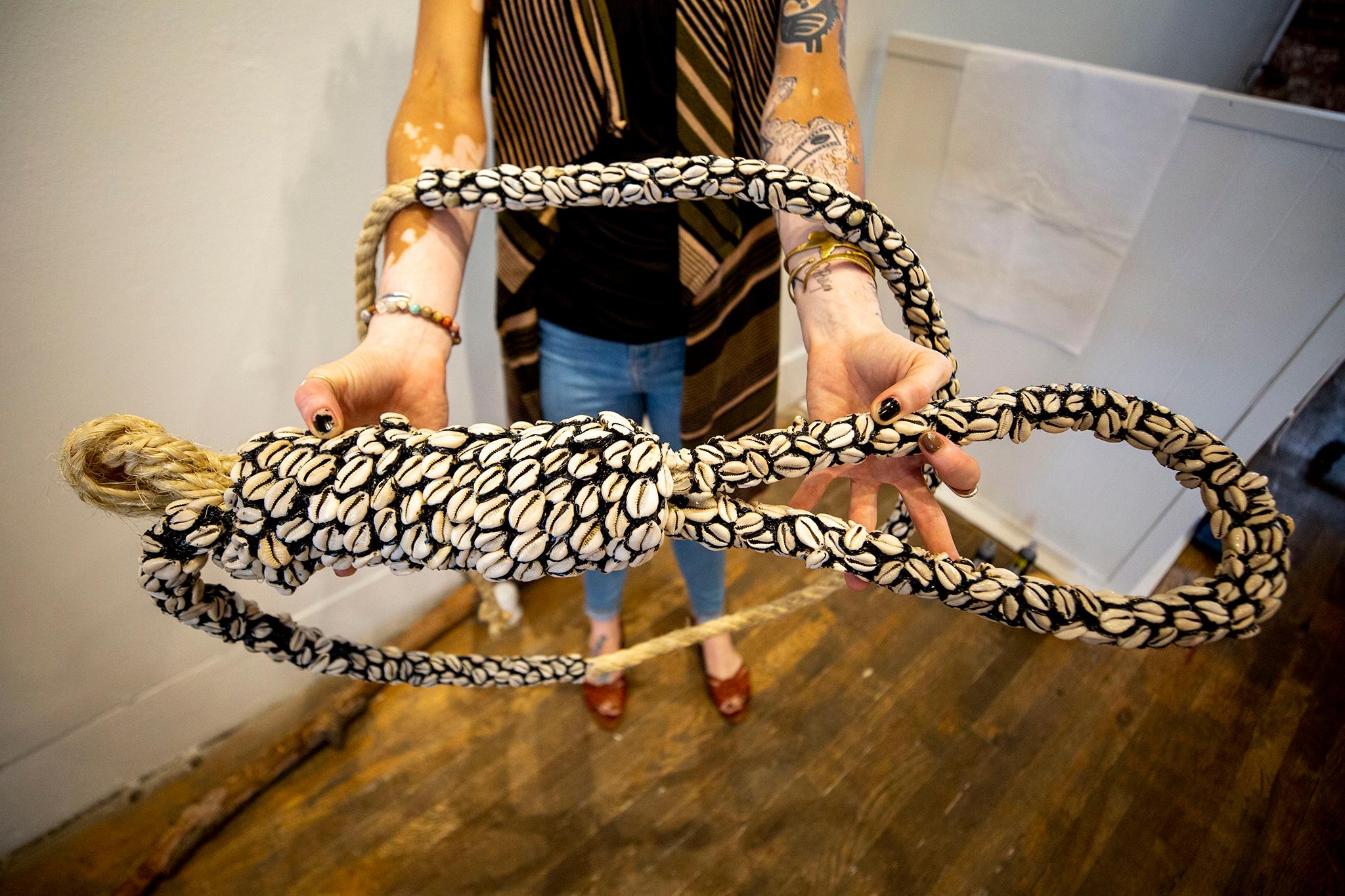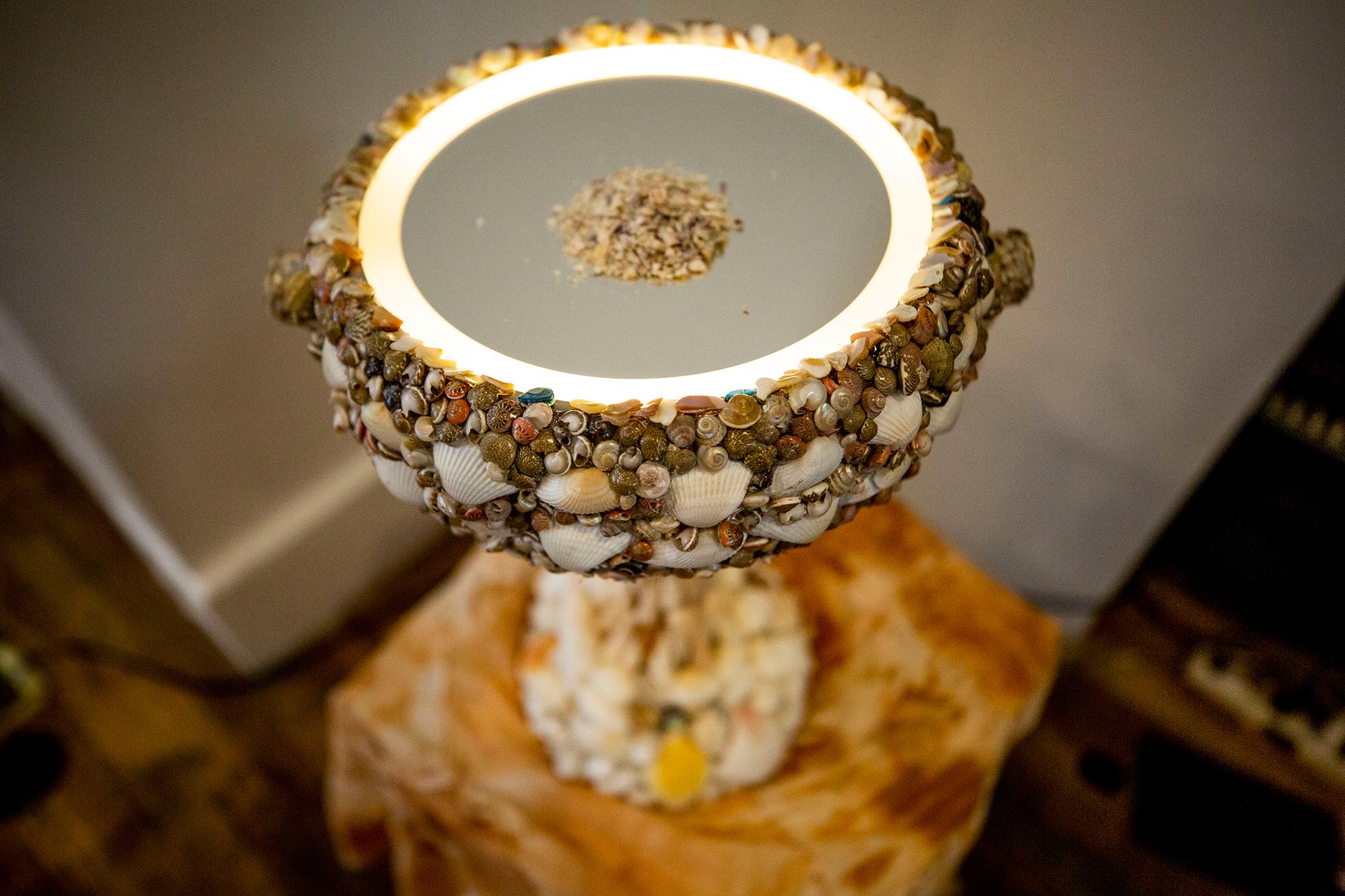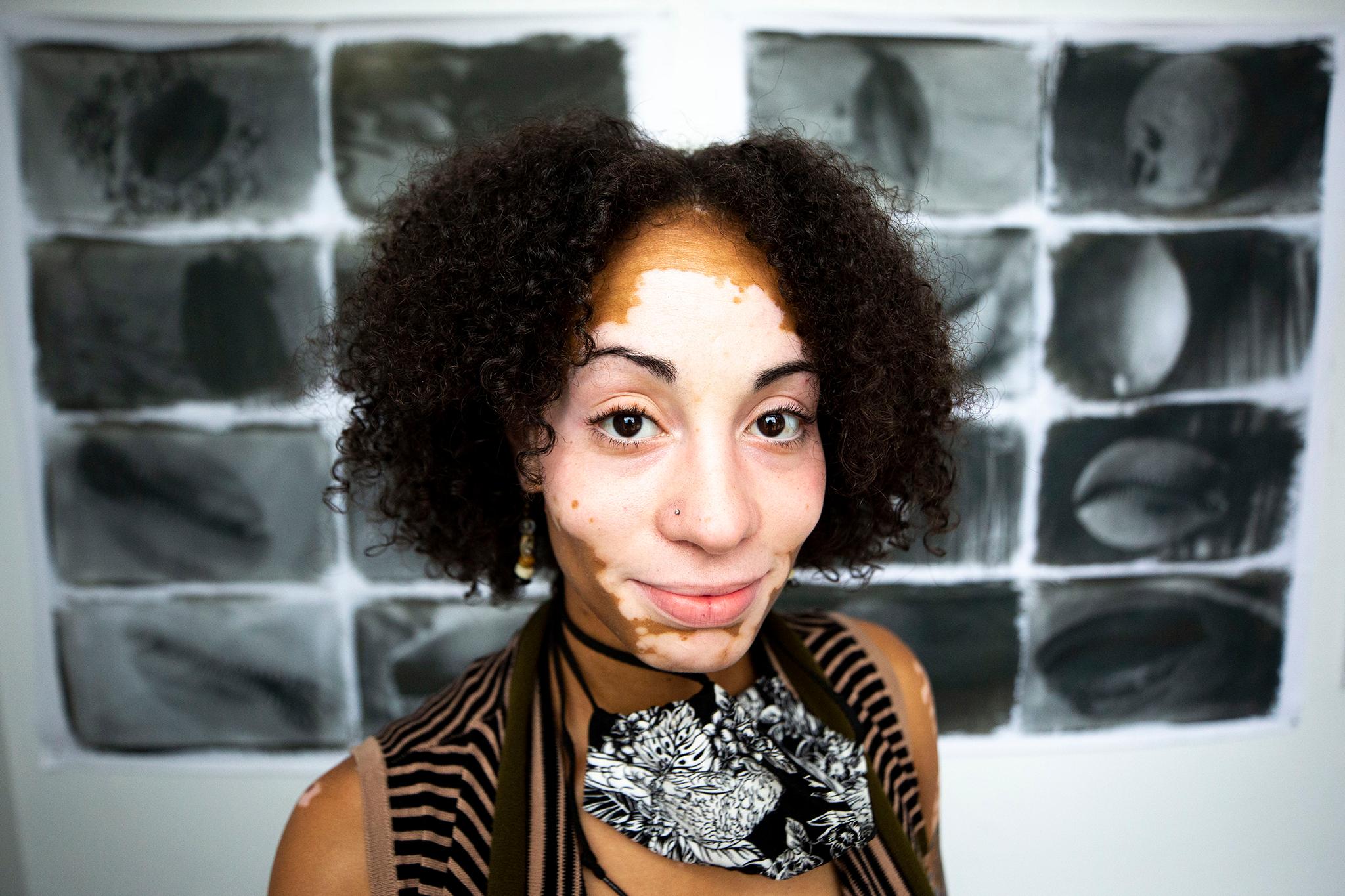Jasmine Abena Colgan approaches printing her photographs like a sculptor.
"The physical print is so durable and so irreplaceable," Colgan said.
She bathes her 100-percent cotton paper in hot water, letting it air dry to shrink the fibers, then trims it.
"It's porous. It represents our skin," Colgan said, comparing marks on the paper to scars. The 30-year-old's own skin is being stripped of pigment by vitiligo, a progressive autoimmune condition.
She places graphite where she wants color to come through, a process that recalls for her the way the American landscape was once sectioned into "whites only" and "colored only" areas.
The printing solution Colgan uses includes particles of gold. Colgan obtained her gold from a 19th century mine in Obuasi, a town in her mother's homeland, Ghana. Traders once marched men and women through Obuasi from the interior on the way to the slave castles on the Atlantic coast to be put on boats headed to the Americas.
Colgan has immersed herself in that history. She has also studied historic photo printing methods and has worked with a scientist, fellow University of Colorado Boulder student Marissa Martinez, to develop her gold solution, since silver is the typical metal used in printing solution.
Colgan layers her carefully prepared paper, negative and solution, and exposes it to light. Then she repeats with negatives she considers parts of the same group of ideas she is exploring in her photography.
"I do everything in a batch," she said. "It's nice to have this done as a family, as a community."
She occasionally works in her dark room late into the night.
"If I was having a bad day, I would just go and print," Colgan said. "It does become therapeutic. Because you have this control to print something in this time of destruction."
Racism is the destructive force to which she is referring. It's a theme of her art.
"My art is my way of confronting institutionalized racism," she said.

Colgan's parents met when her father, who is white, was a Peace Corps volunteer in Ghana. She was born in Colorado and grew up in the Denver suburbs, where her dark skin drew attention and comments meant to make her feel she did not belong. She's been asked if her mother speaks English. A racial slur that's been directed at her figures into one of her sculptures that's part of her upcoming show at Leon art gallery in Denver.
"Every day is a battle. You never know if you're going to be pulled over. You never know if you're going to get verbally attacked, assaulted."
Colgan also feels deeply connected to her white relatives, particularly her grandmother, who settled in Fort Morgan after growing up on a cattle farm in Nebraska and traces her family to Ireland. Colgan and her three brothers spent summers either with their grandmother in rural Colorado or with relatives in Accra.
Irish and Ghanaian roots; colonial, African and personal history; and modern politics and aesthetics all figure into Colgan's photographs.
"There's a lot of stuff," she said.
Colgan's show opens Saturday at Leon, the first exhibit inside the gallery since the pandemic hit.
The show, titled "Human Currency," includes Colgan's three-dimensional sculptures as well as her photographs with their multiple dimensions of meaning.
The subject of all of her photographs in the Leon show is the cowrie shell, used around the ancient world, including in Africa, as currency. Colgan said because of its history, the shell evokes both the question of what a human is worth, and because it resembles the vulva, womanhood. For one of her sculptures, Colgan filled a burlap sack with 6,370 cowrie shells, which she said she learned represented the price of a human after researching the history of the slave trade. The burlap sack refers to more recent atrocities: Attackers would sometimes place a burlap sack over the head of lynching victims.
Another Colgan sculpture, one that confronts visitors as soon as they enter Leon and can be seen from the street, is fashioned from a noose hanging from a tree branch fixed to a wall. As Colgan worked Thursday with Leon's directors, Eric Nord and Eric Dallimore, to get the show ready, a passerby told her the noose would be seen as hurtful and provocative.
Colgan said her intention was to move people, as the mother of Emmett Till did after the Black 14-year-old was lynched in Mississippi in 1955. Emmett's mother, Mamie Till, had insisted on an open casket at her son's funeral so that the world could see the reality of racism and racist violence in America.
In recent months, four Black people have been found hanging from trees in California, New York and Texas. Colgan is among many people who are suspicious of authorities who say the deaths are suicides.
Dallimore said the noose forces a conversation about truths some would rather look away from.
"That's what privilege is, to say something doesn't exist," said Dallimore, who is white.

Colgan's photographs and sculptures scattered throughout Leon create an installation in which visitors can immerse themselves -- but not touch, because of coronavirus health precautions, Nord said. It's a "physical representation" of the nuances of Colgan's work, he said.
"You might not know what the different layers are intellectually. But you might sense it," he said.
Nord finds the surface of Colgan's work fascinating and beautiful, and said that might be enough for many viewers. But "there's nothing wrong with it having more meaning the more you dig into it," he said. "It has all this research and personal information behind it that gives it all these multiple layers of meaning."
Colgan is primarily known as a photographer. Nord first encountered her work last year when he was helping review the portfolios of artists who wanted to be included in the Month of Photography, a biennial festival of exhibits at galleries and other spaces across metro Denver.
In an earlier project called "Tough Skin," Colgan photographed people with vitiligo, the skin condition she was diagnosed as having when she was an undergraduate at the University of Colorado Denver. Colgan had begun documenting her own skin's change from brown to mottled brown and white at UC Denver.
Colgan, a gymnast when she was at Arvada's Pomona High School, initially planned a career as a sports photographer or model. After earning her bachelor's, she processed pictures at Mike's Camera, served at a restaurant and worked as a dental hygienist, among other jobs. All the while, she realized her homes were filling with photographs and other art she was making.
She eventually enrolled in the MFA program at CU Boulder, which should have wrapped up this spring with a student exhibit. The coronavirus made the traditional final show impossible for her and other students. But she had a body of work available as Leon prepared to emerge from its pandemic shutdown.
After starting her MFA, Colgan moved away from focusing on skin. But vitiligo remains a preoccupation. Colgan created a nonprofit to promote self-confidence among people with vitiligo and is working on starting a shea butter skincare product company that would employ women in Ghana, who traditionally extract the oil from the nut of the shea tree.
Colgan, who wants to teach someday, follows such luminaries as the historian Deborah Willis; Black Panther founder Huey Newton; and Yaa Asantewaa, a woman who in the early 1900s led resistance to the British in West Africa. Colgan said she would one day like to teach.
Derrick Velasquez showed some of Colgan's work last year at his Yes Ma'am Projects gallery. He was struck by how packed with ideas both her studio and her life are.
"Everything that she does embodies who she is," Velasquez said. "Which I think is really incredible. I really admire her for being active and an activist."
Artist Diego Rodriguez-Warner saw Colgan's work at Velasquez's gallery. Her sculptures at Yes Ma'am included a mirror covered in cowrie shells.
"I was struck by the emotional weight of the objects," Rodriguez-Warner said.

When Rodriguez-Warner learned that Colgan would not get an MFA show because of the coronavirus, he recommended her to Dallimore and Nord, in part because he had realized he would not be ready for his own planned show at Leon. Nord was already aware of Colgan when Rodriguez-Warner approached him.
Her work, which she has developed over years, seems especially relevant in this moment, following protests of racism and police violence after the May 25 in-custody death of George Floyd, an African American.
Colgan sees the protests as part of a larger conversation she hopes will lead to an end to systemic racism.
"Through my art work, I'm proud I've been able to develop this conversation about materiality and human value, (about) what matters."
This is the last installment in our series following Leon as it navigates the pandemic.













